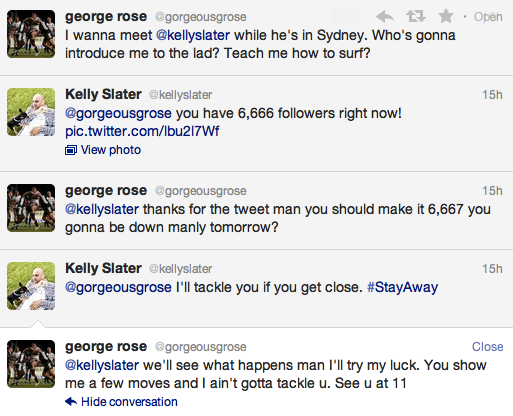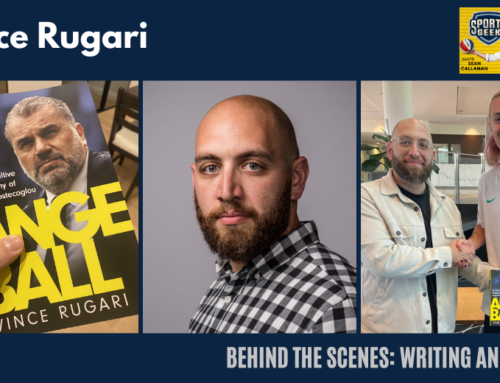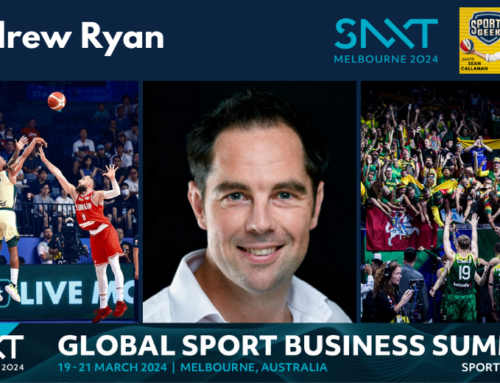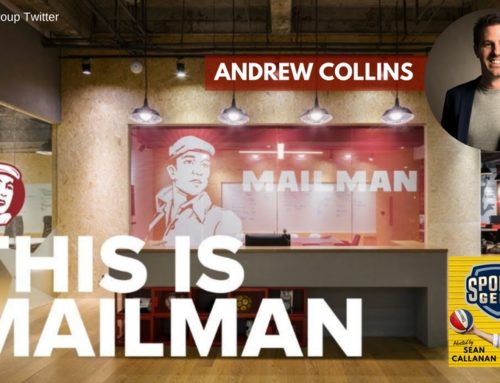In today's ABC Grandstand sports digital segment we looked at the #Kony2012 phenomenon & it's impact on the sports world.
Kony 2012 @ http://www.youtube.com/watch?v=Y4MnpzG5Sqc
Haven't seen the Kony 2012 video then please watch it now.
It has seen many of the influencers listed show support via Twitter & Facebook although @TimTebow is yet to tweet about it despite the amount of tweets asking him to join the cause.
It shows how much influence athletes & celebrities can play in young people's lives not so much a brand endorsers but role models.
Kevin Durant posted this image on his Instagram feed.

How did you find out about Kony 2012? I found out via my teenage kids which show how much influence athletes & celebrities can have.
Sports Geek Medals – NRL edition
With the NRL in full swing we look at the best in the NRL, special mention to Twitter newcomer Billy Slater (@slater_billy) & Cowboys birthday boy Matt Bowen (@mattb_wen1) after the Cowboys win over the Broncos.
Bronze – Wendell Sailor
Pioneer in the NRL & a self confessed mad tweeter, was the only Twitter presence for the Dragons early on.
Silver – Scott Prince
Scott does a good job sharing pics on Instagram & keeping fans in the loop with all things Titans. Like Kevin Durant he showed his support for Kony 2012 on Instagram.
STOP KONY 2012! #stopkony instagr.am/p/H3zh7mCUVd/
— Scott Prince (@scottprince7) March 7, 2012
Gold – George Rose
As discussed George is great at connecting with fans, even if you just uses them to meet Kelly Slater as you can see from the tweets below.
This one I like make it happen RT@seancallanan: @gorgeousgrose @kellyslater perhaps roll with #slatermeetgeorgeorhewilltackleyouintonextweek — george rose (@gorgeousgrose) March 9, 2012

Until next week
Catch it live on Saturday mornings (at 7:40am) when Sean Callanan discuss sports digital with Francis Leach & Amanda Shalala on ABC Grandstand.
Tune into ABC Grandstand Breakfast over the Friday through Monday on ABC Grandstand digital radio.
Follow @saintfrankly//
Follow @abcgrandstand
Podcast Transcription
FRANK: Sean Callanan joins us, the Sports Geek, I'm sure he's got one, but he probably can't say because he works with so many sporting organizations that are teaching him to how use the digital world and talking digital sport with us. Good day, Sean, how are you. Welcome back to Grandstand Breakfast.
SEAN: Good day Francis, Good day Amanda.
FRANK: Can you say?
SEAN: Well, I actually did. I tweeted, I always liked seeing Brian Goorjian coached teams get beaten, so I've gone in the history books so I don't have to worry about it, but as a Tiger's man whether it was the Spectres, Titans, Magic and then the Kings I think he ended up at, I always like beating a Goorjian coached team. You respected him but always liked getting the win.
FRANK: Scott Munn who is the CEO with Melbourne Hearts through and said you're Melbourne team, Francis. I think he's assuming I'm a Melbourne Victory fan, Scott.
AMANDA: You have to claim your allegiance.
FRANK: Well I have to be in neutral these days, don't I? I sort of put down my card carrying Melbourne Victory Membership.
AMANDA: There's no such thing as that, come on!
SEAN: There's a little bit of bias in all everybody.
AMANDA: Yeah.
FRANK: You're right, Scott. Thank you Scotty, and I'll be there cheering for the Heart today, don't worry against the Wellington Phoenix. Now we're here with Sean Callanan to talk about digital media and I guess just beyond the world of sport, as well, something that's been going on for the past couple of weeks which transcends sport but shows the power of the mediums were talking about.
SEAN: Yeah, this week, if you've been on Facebook or Twitter you would've heard of Kony 2012. Did you hear about that, Francis?
FRANK: Unbelievable sort of campaign that's been running online and across the world to try to raise awareness about this man who's been leading the Lord's Resistance Army in Uganda for the better part of 20 years now, but someone's taking it upon themselves to make him famous. Explain what's going on.
SEAN: Yes, so a charity called Invisible Children set up a video. They built a 30 minute video, which is a long video in the Internet world, and the idea behind it is to make Joseph Kony famous, and they want to do that to put pressure on the U.S. government to intervene and help them stop this guy for all these war crimes. But really what I was looking at it from a digital perspective is the manner that they went about it, and the used 2012 as a meme and their targeting 20 influences and 12 decision makers, and one of those influences was an athlete, Tim Tebow, who is an NFL quarterback who polarized the American landscape for his ability to win but also his ability to pray on the field after a big score and “Tebowing” has been an Internet meme of the past 12 months well you get down on one knee and pray after a big moment in your life, so, yeah, part of their campaign is to get a groundswell of support and with 38,000 million views when I sent the email yesterday, it's probably getting closer to 50 million YouTube views today, and that's in five days, so there's not too many people that haven't seen it because it gets shared, but really what they wanted the fans and the common person to get the attention of athlete's and celebrities, so Tim Tebow was one, Justin Bieber, Stephen Colbert, Oprah Winfrey. They wanted really to get these celebrities to take notice of the video and to make this Joseph Kony guy famous.
FRANK: To what end? I mean is it to put pressure on political leaders and institutions like the United Nations to do something about this long running war that he's been conducting in Uganda for decades.
SEAN: Well exactly right. It's been happening for a long time, but they've effectively got some traction with the U.S. government to assist in capturing him and the U.S. government it's pretty clear to say, ‘Well, if it's not in the interest of the U.S. citizens then we won't support it. So the campaign is to actually raise awareness and to make it an issue on the American agenda, and obviously they're going to elections and they wanted to so it's done in a campaign style. There are jokes around that Kony's one the first primary because of the Kony 2012, but, yeah, it has touched a lot of fans. I found out about it from my daughter whose 16 and she was wanting to donate money from their charity drive that they've done. My son posted the link without me prompting, so it’s really reaching the kids.
FRANK: That’s fascinating, isn’t it? It’s almost like Current Affairs being delivered in a way that can actually reach a demographic that would otherwise not tune into the 7:30 report. It would have no relationship with that sort of content delivery whatsoever.
SEAN: Yeah, exactly, so last week we talked about Instagram and we see Kevin Durant, who’s the NBA leading scorer For the Oklahoma City Thunder, he posted an image to stop Kony. Blake Griffin, the slam dunk champ who dunked over a car last year, did the same thing. He posted on Instagram. You know football is worth seeing it and putting it up on their fan pages, telling people, and again, not prompted, but it just reminds me of seeing how other people in that cause, marketing sort of space, will do it. Because you do see a lot of athletes getting—I mentioned span—and it might be ‘Aw, my nana’s sick. Please re-tweet this.’ Now does it help anybody? Probably not, but that’s the main tactic of this Kony thing to effectively span the celebrities until they sit down, watch the video of 30 minutes , then they go, ‘Oh, I’m moved. I’m going to share it.
FRANK: Have you seen it Amanda?
AMANDA: I haven’t actually, but I wonder, Sean, is it effective? Do social media consumers really care what Tim Tebow has to say or if any of these athlete’s get behind the cause? Do we want to hear about their political viewpoints? Does anyone take notice?
SEAN: Well, there are a lot of fans, obviously, that do take notice and if the fans, you know, as Justin Bieber might tweet and say ‘Hey guys watch this and re-tweet it,” a lot of those kids are impressionable and will. And the fact that they are sharing the real issue, internet names rise and fall pretty quickly, will this have some legs? Will this still be a talking point a week later or two weeks later? They’re planning a Cover the Night exercise where they’re going to be putting Kony style posters all around the world on a particular day. And, you know, when we wake up one day and see Kony posters everywhere, that’s the kind of thing; will it continue or will it just be an Internet meme that the kids of today have shared, been impressed by, but they'll move onto something else tomorrow?
FRANK: Fascinating isn’t it? It becomes a question, doesn’t it Amanda and Sean, whether people are genuinely concerned by the issue and will follow-up and continue to persist with their activism or whether it’s just being part of a major event, being part of a crowd, being part of a critical mess, and feeling like you’re involved but having no real commitment to the cause. In the end that becomes exploitative of the situation in Uganda rather than helping it.
SEAN: And there is a bit of that already. There are Twitter accounts that are supporting Kony and asking people for followers, and there’s nothing stopping those people three days from now changing the name of the account and start selling iPads. You know, those kinds of things, and will people donate money or will people support the cause other than sharing a link? Because really, sharing a link and watching the video and getting tracked up and coming on, it is not going to help any Ugandan children. But, you know, actually maybe donating or putting it towards a cause that you believe in will. But, you know, I like the fact that even if there was talk that it could have been a banksy scam—a whole just a stunt to see if it could happen. But if it’s making my kids think about the world and wanting the world to be a better place, I’m okay with it, and that’s sort of how I sort of sit with it.
AMANDA: I find it really interesting sort of thing all together. I mean are the eyeballs enough as a thing to start with. Are you saying there are 50 million viewers or people who have seen it on YouTube, as a starting point with any sort of thing in the digital sphere. Is that enough of a kick start?
SEAN: Well the main thing is that is takes from social into mainstream. Like social is big and it’s big in my world but it’s still, you know, to get things on TV, to get things talked about on radio, to get the things talked in the newspaper is still a way a lot of the majority of the people are. So it’s the fact that Channel 10 ran the whole video in primetime on the Project would’ve got a lot more coverage than the people watching it on YouTube. It would’ve got families discussing it potentially, discussing charity and world issues, so the next steps are will we still be talking about it in a month’s time and will there actually become a result of it?
FRANK: 1-300-460-644 is our talkback number. Love to hear from you if you’ve got time to give us a call. Have you been affected by this kind of campaign, and when you see your favorite sports star retweeting this stuff, do you actually stop down and have a look or do you just see it as just part and parcel of I guess their public profile—do they really care or are they just using it in a sense to sort of round out their public profile?
Give us a call, 1-300-460-644 is the talkback number here at Grandstand Breakfast if you want to join the conversation. Sean Callanan, the Sports Geek, is talking digital sport with us here this morning. Have any of the major sports clubs reacted or have a policy about their players getting involved directly in a political campaign such as this?
SEAN: No, not particularly because really the players and their own brands for the most on social. Yes they do pull them into line if they go and make a blue in some instances, but most of the athletes can say what they want to say, and we saw that with the lockouts for the NFL and the NBA when they started to share their voice. Even in the AFLPA when they had their negotiations, they started to ban together and put their views across.
FRANK: That was a very, very conscious campaign. The AFL was blindsided by that, wasn’t it, with the players coming out quite directly on Twitter and making their feelings known without being checkered by their responsibility to their clubs to say nothing.
SEAN: And the thing is the players are just starting to understand and that’s why I thought the Kony campaign sort of highlighted that you’re an influencer. So, yes, you can just be tweeting about what you’re doing and when you’re going to the game, but you’ve got to realize and it goes back to Charles Barkley who famously said, “I’m not a role model.”
FRANK: Chris Judd said that as well.
SEAN: But the thing is, you know, if they are going to tweet an article like this or tell people to watch this video they are influencing a lot of kids, so, what is it? “With great power comes great responsibility,” if I want to quote Spiderman, but that’s…
FRANK: That's where all that wisdom comes from…**laughter**
SEAN: Exactly, that's exactly what athletes have when they start getting these large followings on Facebook and Twitter.
AMANDA: Well looking at certain athletes that are using Twitter effectively from the NRL world who have you picked out for us this week?
SEAN: Yes, so looking at the medals because the NRL has been kicking off for us…
FRANK: On the podium, 3, 2. 1.
SEAN: On the podium, yeah, I did meet Billy Slater during the week, slater_billy. He’s just new to Twitter so he didn’t quite make the podium and well done to Matt Bowen, mattb_win1, not the best handle but not a bad 30th birthday to get the win over the Broncos, but my bronze medal goes to Wendell Sailor.
FRANK: Big Dell.
SEAN: Big Dell, so real Big Dell on Twitter, a mad twitterer, loves his tweeting. He was actually tweeting for the Dragons when he first started. Scotty Prince up in Gold Coast does a pretty good job. He used his Instagram, scottprince7, but I have to give my gold to my man George Rose or gorgeousgrose on twitter because he doesn’t hold back. He says what he thinks and he’s always engaging with fans. Even as late as last night he was tweeting trying to find a way to meet Kelly Slater, who is in town, and so he was reaching out to his fans saying, ‘C’mon guys how can I meet Kelly Slater?’ I tried to start the hashtag when Kelly met George, but he didn’t like that. He thought it was a little bit to chi clique, but, yeah, George is pretty good value. He was trending during the NRL Grand Final, trending worldwide, but it might have been because he whacked a guy in the head. But he’s a pretty good value on Twitter and so he gets the gold medal.
FRANK: There are our 3, 2 and 1 for this week. Sean, good day mate, and thanks for coming in. We’ll speak to you again next week.
SEAN: No worries guys.
FRANK: Sean Callanan in the house, Sports Geek, talking digital media and sport with us each Saturday morning here on Grandstand Breakfast.




